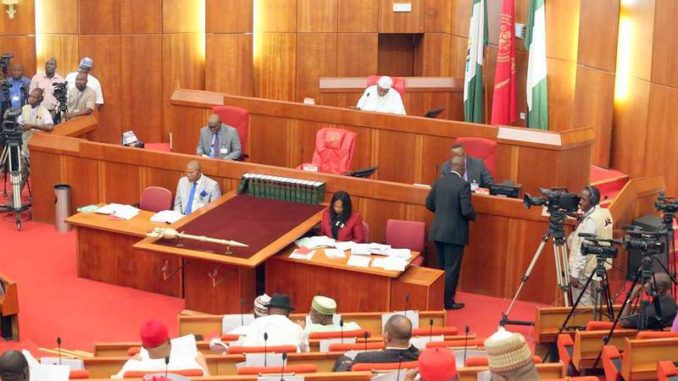
A bill seeking to regulate journalism practice in Nigeria has drawn strong skepticism and condemnation from foremost media rights groups in the country.
The Senate pushed the controversial Nigerian Press Council Amendment Bill through second reading earlier this year, eliciting widespread outrage from media practitioners who immediately identified it as an attempt to revive some of the relics of dictatorship that freedom lovers thought modernisation and democracy had consigned to the dustbin of history.
Senior executives of the Newspaper Proprietors’ Association of Nigeria, Nigeria Guild of Editors, Nigerian Union of Journalists and Broadcasting Organisation of Nigeria held a strategy meeting to consider the ramifications of the bill on July 19 and rose with the conclusion that it was draconian, primitive and unconstitutional.
The groups, members of the Nigerian Press Organisation, said the bill should not have been admitted for deliberation by the Senate because of a lawsuit that had been instituted against the existing Nigerian Press Council, which critics said was created by former military dictator Ibrahim Babangida to check independent and vigorous media.
“The proposed bill is unconstitutional as it runs against the principles and tenets of the rule of law and is actually subjudice given that a case on the subject matter is still pending in the highest court of the land – the Supreme Court – in view of which the bill should not have been drafted in the first instance,” the groups said in a joint statement to PREMIUM TIMES Sunday.
The Nigerian Press Council said it was necessary to have a body that would arbitrate between the media and the public, without necessarily gagging or regulating independent media practitioners out of business. Its officials argued that it would be unfair, if not impossible, to allow the media regulate itself, adding that few or no disciplinary actions had been activated to curb unethical conducts amongst journalists in the country.
But the media advocacy groups said attempts to re-legislate the NPC even while the existing one was still being challenged was not only suspicious but also bore the hallmarks of a totalitarian regime which President Muhammadu Buhari once represented.
Mr Buhari’s first outing as a military dictator in the 1980s saw the imprisonment of journalists who were handed long sentences for writing articles which the junta considered critical of state actors at the time. Although he never apologised for the controversial acts of the past, he, however, labelled himself as a “converted democrat” in the run up to the 2015 elections.
“That the bill is, for all intents and purposes, draconian and anti-press freedom being an amalgamation of the obnoxious Public Officers Protection Against False Accusation Decree No. 4 of 1984 and the Newspapers Registration Decree 43 of 1993, both vestiges of the dark days of military rule and therefore incurably and irreparably bad, being also inconsistent with values of our democratic society,” the groups said in a slew of observations during their meeting latest week.
They argued that the Nigerian Constitution in Section 39 and other binding statutes such as the African Charter on Human and Peoples’ Rights forbade state regulation of journalism practice, and the controversial bill contained provisions that sought to do exactly that.
The groups said the bill would create “a curricula in training of journalists and usurp the powers of the regulatory bodies in the educational sector affecting media training especially the National Universities Commission and the National Board for Technical Education,” a measure that it said could be misused by state actors.
The media advocates accused the proponents of the bill of trying to “create the impression that the Nigerian media community does not take the issues of ethics and self regulation seriously whereas it is a well known fact that the mechanisms actually exist including the Code of Conduct of Journalists in Nigeria, the Ethics Committees of the NUJ and NGE and the recently launched Nigerian Media Code of Election Coverage endorsed by media stakeholders.”
The bill is the latest attempt by Nigerian lawmakers to regulate speech under the current dispensation. Since 2015 when both Mr Buhari and the 8th National Assembly were inaugurated, lawmakers have proposed measures to curb activities on social media and in the mainstream press, but most of the proposals were withdrawn following public backlash.
It was unclear whether Mr Buhari had any input in any of the bills, but he had not openly condemned them. Still, the president mentioned in his recent appearance at the International Criminal Court that he was open to freedom of speech and other fundamental rights of citizens.
A spokesperson for the Nigerian Senate did not immediately return PREMIUM TIMES’ requests for comments about the controversial bill and the position of media groups about it.
“The bill should be dropped forthwith until the determination of a similar case in the Supreme Court of Nigeria,” the groups demanded. They also urged the Nigerian Senate to “borrow from best practices in other jurisdictions that have expressly provided for and guaranteed press freedom without any form of government interference.”
Rather than dissipating energy on primitive policies that would most likely elicit overwhelming rejection from citizens, the parliament should focus on promoting legislation that would engender public transparency, accountability and a sense of belonging amongst the citizens, the groups said.
“The Senate and indeed the National Assembly should enable the media in the exercise of its constitutional obligations as spelt out in section 22 by passing laws that will promote transparency, accountability and open government such as mandatory delivery of the State of the Nation address by the president and State of the State Address by governors on specified days of the year; ensuring by law, presidential and Governorship Election Debates before elections; complete transparency in election funding including public declaration of sources of election finance by all candidates and political parties and ensuring the integrity of our electoral process, etc,” they said.
END

Be the first to comment